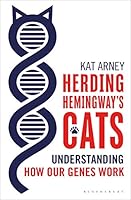Sublime
An inspiration engine for ideas
A Revolution in Biology
bitsofwonder.co
Robert Sapolsky: The Biology of Humans at Our Best and Worst
youtube.com
Perhaps the greatest “phase transition” in our thinking that such an approach could engender is the maturation in our willingness to live with relatively high levels of uncertainty in the domains of complex phenomena—and thus give up on ideas like complete “cures,” the elimination of “risk,” the design of perfect “stability,” and achieving total
... See moreJessica C. Flack • Worlds Hidden in Plain Sight: The Evolving Idea of Complexity at the Santa Fe Institute, 1984–2019 (Compass)
The Other Brain: From Dementia to Schizophrenia, How New Discoveries about the Brain Are Revolutionizing Medicine and Science
amazon.com
Worlds Hidden in Plain Sight: The Evolving Idea of Complexity at the Santa Fe Institute, 1984–2019 (Compass)
Geoffrey West • 1 highlight
amazon.com
The simplest
multicellular animals we know are Porifera and Coelenterata (say sponges and jelly
fshes);
actually, Porifera have no Nervous System and Coelenterata have Nervous Systems with no
central organ comparable with a brain. Canadian biologist Sally Leys’s opinion (I quote by
memory) is that our concept of a Nervous System based on a brain... See more
multicellular animals we know are Porifera and Coelenterata (say sponges and jelly
fshes);
actually, Porifera have no Nervous System and Coelenterata have Nervous Systems with no
central organ comparable with a brain. Canadian biologist Sally Leys’s opinion (I quote by
memory) is that our concept of a Nervous System based on a brain... See more
Roberto Maffei • Article

